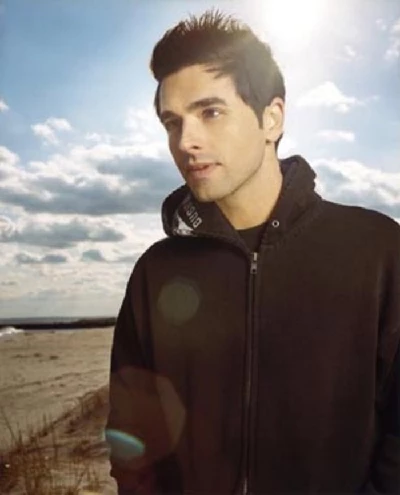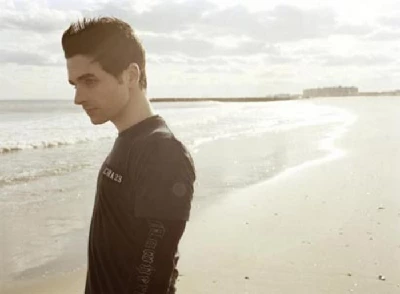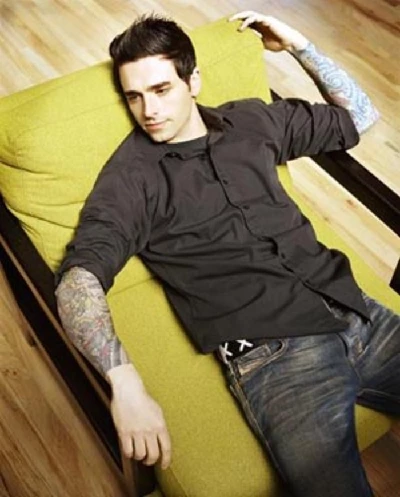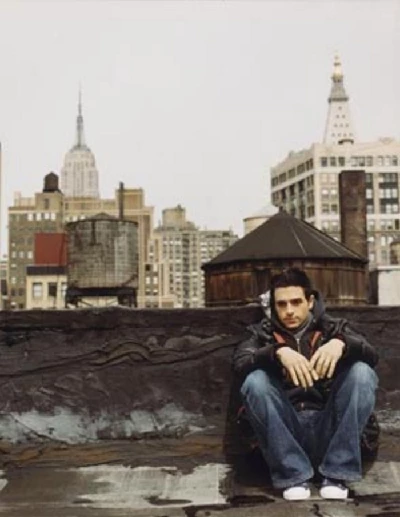published: 23 /
11 /
2007
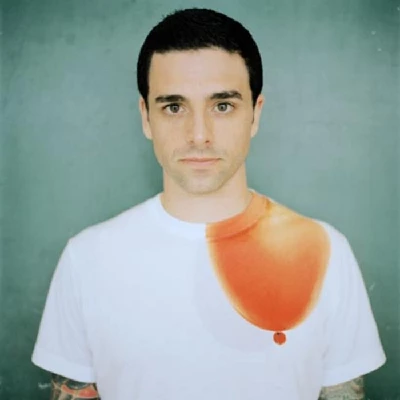
Starting as a solo project for Chris Carabba and soon expanding into a full-band, Dashboard Confessional have just released their fourth album, 'The Shade of Poison Trees'. Jonjo McNeill speaks to Chris Carabba about his decision to return to his acoustic roots with it.
Article
Dashboard Confessional started as a solo project for Chris Carabba and soon expanded into a full-band lineup. With their fourth and latest album ‘The Shade Of Poison Trees’ they have rediscovered the acoustic led sound that endeared them to so many people with their first two albums, ‘The Swiss Army Romance’ and ‘The Places You Have Come To Fear The Most’. Fairly huge in America but (beautifully) still almost unknown in the UK, they were over here to support the possibly not perfectly-suited Maroon 5 on their arena tour, which is when I got to sit down with Carabba and listen to his thoughts on making records, touring the world and the importance of keeping it underground.
PB : You have a different kind of dynamic to the band on the new album.
CC : For me it’s a return to form, to my second record (‘The Places You Have Come To Fear The Most’). That became - not less interesting - but I knew if I didn’t change things at that time I’d get boxed into that same thing forever.
When I started Dashboard I had all these other bands I was in and whatever felt like doing I could do – if I wanted to play complex math-rock I could be in this one band, or if I just wanted to be screaming I could be in this other band – but of course it’s only Dashboard now. I wanted to take that and say "I don’t have to just be this part of my writing." So I made a decision to make ‘Dusk And Summer’(Dashboard Confessional's third album) with that mentality and expanded the setup with the band.
I don’t really want to get boxed into that either though, I just wanted to remind myself that I’m allowed to do whatever I fancy. It became a really attractive, romantic notion – rebellious in essence. The whole beginning of Dashboard was borne out of a bit of rebellion when I found myself in a very stifled place with all these other bands I was in. I really respond to rebellion – I grew up in the punk rock scene, I come from the poor side of a rich town – so all these things melted together into a beautiful stew of the moment.
The record label wouldn’t have been too happy if I’d told them I was going in to make this record, so I didn’t tell them. I worked out the songs I wanted to do. I sent the tapes to my band mates and said "Here’s the ones we wanna take on – remember the original vision", which was not to overdress the original ideas. I think my band mates actually took that to heart better than I could imagine, and it’s nice to have guys that are so unified in spirit.
I never had such a good band when I made those other records – I had a good band, but this is THE band. You spend years looking for players like this and most people won’t find them. We were working on these songs and I’d suggest adding something and the guys would tell me "Don’t forget the original vision – it doesn’t need all this stuff, it doesn’t need to be so busy" and it takes a really great musician - a really confident musician - to be able to say to a writer "I don’t think I should play on this song", but we have that.
We never told anyone we were doing this record either. We did it and I held onto that tape – on my person – for probably six months. I carried this thing around with me all that time. And then I took it to my label after that time – these are guys who’ve been so supportive of me from the start – and said "Well, I did another record!" and they were rejoicing, then I told them that I wanted it out in six weeks and they just jumped on that!
PB : How have you found the tour over here?
CC : I just done a tour in the States so I’m on a tour clock. I go to bed at 5 a.m. and get up at 11 a.m. or whatever, so now I’ve come here and I’ve got good old American jet lag on top of the tour lag!
I’ve not had much time to do any sightseeing this time, I’m only here to play the shows, but I like that I can work up from the bottom over here again. I like that we’re not a big deal over here, and I know the reasons. It’s because we haven’t had a chance to do things the way we like to do things. Playing the tiny clubs every night, making friends, doing it all again and building it up. The underbelly I miss. I see my heroes – Johnny Cash, Tom Petty – and see them playing these big shows like arenas but that’s not why I fell in love with them. I fell in love with them when they were underground. On these bigger tours it’s very much a lifetime of sameness. All these arenas are exactly the same! It seems a bit like time away from the spirit of rock and roll, to be honest!
PB : It must be an odd vibe, playing these huge shows for Maroon 5 fans ?
CC : It’s a fun thing for us as a band, as we can concentrate on other talents we have that we don’t showcase in our own show. It’s good to be able to say "Let’s play those guys onstage tonight."
The crowd has come down to see Maroon 5 and I’m thinking I should play this song or that song, because that’ll connect with them or whatever, but ultimately it dawned on me that we’re just here to hype the crowd up really. And I’m not above that at all, I’ll get the crowd excited ! I don’t think we’ll do this supporting thing again though, unless it was U2 again.
What I would say is if you want to see a Dashboard show, go to a Dashboard show. The show we’re doing here isn’t us. These arenas aren’t us.
PB : Last time you were here (UK) you played the London Astoria and every single person sang every single word back at you. Were you expecting that level of adoration at all ?
CC : Its great, especially because we’re so deeply underground over here, which is awesome. There are peers of mine, from the scene, who want to conquer the world.
As long as I wake up and have the spirit – ‘cause all my heroes aren’t from the punk rock scene, there’s guys like Petty and Cash and Bruce Springsteen. I’m a hero-worshipper, I love them like they’re family. And I just want to be like them. I want to be Johnny Cash in my heart!
I like the fact that I can come some place beyond my shores and have to fight for it. So to come over here and have people know me – I don’t want people to know me. I like it when people know me at the shows, but I like it to be in a club where everyone knows what this is about, where I’m no different to them. I haven’t been on the cover of every magazine and I don’t date such-and-such a Hollywood starlet in the press. I’m going to let you into my life with these songs, but I don’t want to have to show you every detail.
We’re in an era where rock and roll is invented by the television, I have such a distaste for that sort of thing. So I love to be able to come over here and be reminded that there’s still a network of people underground who really don’t care if you were in a movie, or whether you won the pop idol contest or something. In fact, they wouldn’t like you as much if you had. People like me.
I genuinely feel like I’m with friends or co-conspirators at our shows, like we’re cooking something up that no-one’s going to know about, and if they did know they’d change the way they looked at what they liked from now on.
PB : Going back to the album, you talked about not overdoing it with this one. Is that something you thought about the last album?
CC : Well, it’s not that there’s too much gloss. You can have polish. Recording is an art form – it’s different to performing and writing, but it’s an artform. I think we wanted to present things as fully as we could, using everything that was available to us. It still has the edges, but they’re minimized by other layers. You need to recognize when you’ve met your point where you’ve done what you can to embellish the song, and you’ve presented that, and there’s enough air and jagged edges around it that the listener can hear it through their own musical imagination.
Whenever I listen to simple records I hear a whole other thing going on. There’s orchestration going on in my mind or whatever, you know ? I’m not saying I’m Brian Wilson or anything - I’m not that good - but you should leave room for other melodies to fill.
I’ve become more attached to those records like that because my imagination is invested into them. It’s hard to do because the studio is a temptress, and you want to show what you can do, deliver the song kind of like it’s your child. You want it to have everything it needs when you push it out the door.
PB : With your first two records what connected with a lot of people was the sparcity of the sound. Do you feel re-energised by going back to these type of songs ?
CC : You know what ? I do feel re-energised. I mean I wasn’t sapped of energy in the first place, yet I feel that way now. I kind of realised that on the other records. I’d put up a bit of a wall. It’s not a heavy veil or anything - sorry for the mixed metaphor - it’s like I almost told the listener how I was feeling. I gave them enough to figure it out but I didn’t just tell them. Except I like to tell them> I like to plainly give the song what I think it’s asking for.
With the new record, as I was doing it I started to realise how easily criticism and accolades come to a guy who’s baring his soul and how that can become quite an obstacle to creativity. So I started this record in secret and I discovered I was reinvigorated for it. I recorded it, and listened to it, and just put it to bed. After a month or two I listened to it again, and I was hearing things I hadn’t heard before. And that to me is always a sign that my subconscious is ahead of my conscious understanding of what’s going on in my life or in the world. I listened to it right before we released it, and I realised that that veil is still there a little.
I only realised that because I’d started writing songs for my new record, and the most freed up I’ve ever felt since those first two records when I didn’t know if anyone was listening, was now – when I knew nobody was listening. It was like the days when if you had my record I knew you because I’d given you the recor d! Anyway, I’ll be damned if I’m going to censor myself or my feelings, and I feel with ‘Poison Trees’ I’ve gotten away from even thinking about that.
PB : Next record? Already?
CC : I think I’ve got twenty songs ready. We’ll maybe need twelve or thirteen for a record to make sense. I’m pretty far down the road. It’s done, it just needs to be arranged and at the minute I don’t know what kind of record it’ll be yet. I have a hunch – I don’t know, it’s hard to say! It’s starting to become more defined now, the more I play it. But as of yet I’ve only played these songs by myself so who knows where they’ll go with the band involved.
PB : How long do they keep to yourself before you show the band ?
CC : Well, I like to have the guys as part of the whole process. I think that’s very important. I’ll do a Dictaphone demo, and email it to the guys straightaway. Then I’ll send them the next demo where I play all the instruments. It just means there’s always someone there to make sure sure you’re turning towards, and not away, from the goal of the song. Someone will say "Remember the Dictaphone version? That was the one!" and its important to have that, to keep you on track. They’re brilliant artists. these guys. I respond to the excitement they get from doing these songs, and I’m very lucky to have them with me.
With that, Chris Carabba went back to join the band he so clearly loves, and they played a show that nobody paying to see Maroon 5 really deserves to see. The live act is different to the records, but equally brilliant. Let’s hope he does come back and explore the underbelly he misses so much; because I have a feeling it would love him.
Picture Gallery:-
